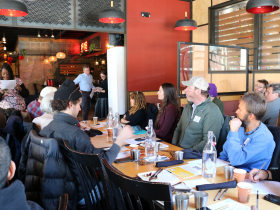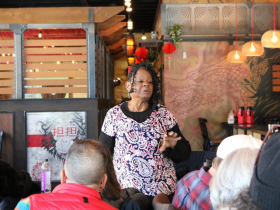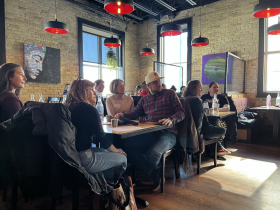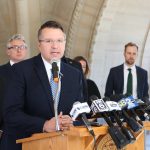Farmers, Chefs Call For Climate Action at James Beard Foundation Event
A roundtable discussion this week on climate change's impact on local industries.
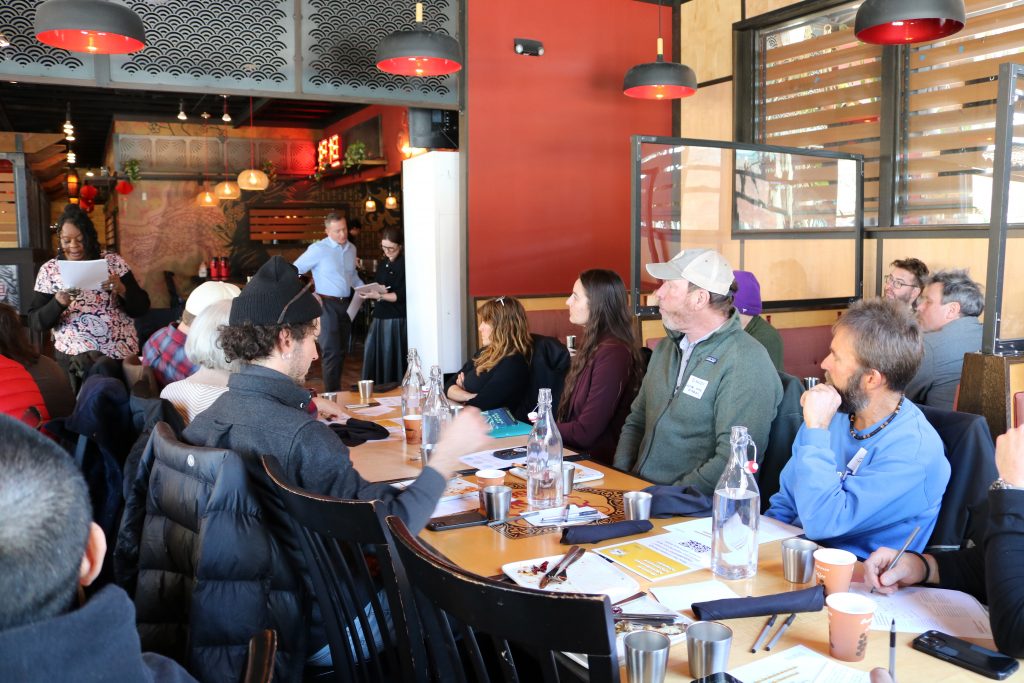
Local chefs, farmers and elected officials at a roundtable hosted by the James Beard Foundation. Photo taken Feb. 19, 2025 by Sophie Bolich.
As temperatures in Wisconsin dipped below zero this week, local restaurant traffic mirrored the mercury — plummeting. Meanwhile, the state’s prized patio season has been disrupted in recent years by pollution from Canadian wildfires, adding to the growing list of climate-related challenges for hospitality businesses and their partners.
On Tuesday, local chefs, farmers and elected officials gathered at a roundtable hosted by the James Beard Foundation (JBF) to address increasingly erratic weather patterns and their impact on both industries and individuals.
The hours-long event, which took place at DanDan over plates of egg rolls and noodles, builds on the foundation’s previous initiatives, including a letter signed by more than 500 chefs urging U.S. Congress members to take immediate climate action through federal funding.
The group’s discussion centered on individual-level solutions and strategies to maintain pressure on local and state governments. Attendees also shared personal accounts of climate change’s effects on their work and communities.
Dan Jacobs, co-owner of DanDan and EsterEv, noted that spring is no longer as predictable, with seasonal ingredients like asparagus, radishes and rhubarb now appearing later in June instead of May. “It’s such a short window,” he said.
The shift has forced Jacobs and his business partner, Dan Van Rite, to find creative solutions. “We have to look at different ways to produce something that’s still fun and interesting.”
Melissa Buchholz, co-owner of Odd Duck, said that menu changes can work for smaller operations — like her own restaurant — but is less feasible for larger establishments or those relying on specific ingredients for cultural dishes. Those who can’t pivot must then face price increases, ingredient shortages and even the prospect of permanent closure.
Further up the supply chain, growers are facing the elements head-on. Julia Lazarski of Hazelwood Farm recalled a 2024 hail storm that “shredded” a large swath of her leafy greens. “What used to be a once-in-a-decade storm is now happening every year,” she said.
Lazarski was poised to sign a contract with the Natural Resources Conservation Service (NRCS), which would have enabled her to implement a high tunnel greenhouse to scale up operations, diversify and protect her crops, and extend the growing season. However, her progress was stalled when a federal funding freeze went into effect last month.
“It’s basically putting any plans for expanding my business on hold indefinitely, and it’s extremely disappointing,” she said. “I love what I do, and I want to continue to do this … but it’s hard to absorb the cost of these severe weather events when they’re happening so often.”
Lazarski isn’t alone in her efforts to diversify crops. Research indicates the practice is beneficial for both business and the environment, but attendees noted that it doesn’t always meet the criteria for federally subsidized crop insurance programs.
“[Growers are] going on such slim margins, or in many instances, losing money,” said Sandy Syburg of White Oak Farms. “They aren’t going to take those risks, so it needs to be incentivized.”
Farmers emphasized the accelerating effects of climate change, making it necessary for them to adapt on the fly to a landscape that’s shifting with every generation.
Anne McBride, vice president of programs at JBF, stressed the importance of personal stories like these in shaping policymakers’ decisions.
“Lawmakers are in your restaurants in a way that they might not be on farms or in other businesses,” McBride said “When you say, ‘This is the impact on my business — I’m a chef, and because of extreme weather events, I’ve had to close more often, raise my menu prices or lay off staff — these are the ways it’s affecting me,’ it’s not an emotional argument. It’s a personal one, but it’s also data-driven. With these numbers, you can talk to anyone, because that will resonate.”
The Milwaukee event was the latest in a series of JBF-led roundtables across the country, including stops in Los Angeles, Atlanta, Minneapolis, Denver, Houston and others. It’s part of the foundation’s ongoing mission to support climate-smart legislation and preserve funding for conservation through the Inflation Reduction Act and Farm Bill. Both face opposition from Republican lawmakers.
The new presidential administration, coupled with a Republican-controlled Congress, further imperils future funding, according to Patricia Griffin, a partner at government relations firm NVG, LLC.
“They are bringing about an agenda that, unfortunately, is not particularly friendly around conservation and climate support practices at the moment,” she said.
Griffin urged attendees to contact their representatives and express the importance of passing the 2023 Farm Bill, a legislative package encompassing hundreds of billions of dollars in funding for initiatives ranging from forestry to the Supplemental Nutrition Assistance Program (SNAP).
The bill, last passed in 2018, is meant to reauthorize every five years, but is often delayed. “I don’t think it [reauthorization] will happen this year, given that there are much bigger agendas and budgets to pass,” Griffin said. “It’s unfortunate, but it will probably be delayed again.”
“It is a complicated and frustrating time for a lot of us in Washington, D.C.,” she added. “But what they want you to do is not participate. They want you to be frustrated and step away. And that is the last thing we should do.”
Congresswoman Gwen Moore was one of several elected officials to attend the roundtable. She took aim at House Republicans’ proposal to cut $230 billion from SNAP over the next decade, noting that the move could severely impact local businesses and the workforce.
“Don’t let anybody tell you that they are cutting waste, fraud and abuse,” she said. “We can’t let them distract us with this ‘Welfare Queen’ narrative. If you cut $230 billion out of SNAP, you are hurting farmers, you’re hurting the restaurant industry, you’re hurting the workforce.”
Buchholz connected the fallout back to the hospitality industry, noting that restaurants disproportionately employ single mothers who rely on programs like SNAP to get by. “Those cuts also impact our workforce,” she said.
The independent restaurant industry is the fifth largest employer in the U.S., with 3.9 million workers accounting for 3% of the country’s total workforce, according to a report from George Washington University’s Global Food Institute and the James Beard Foundation. In Wisconsin, restaurants and farms account for 20% of the state’s workforce.
State Representatives Ryan Clancy and Darrin Madison Jr., Senator Chris Larson, WEDC Secretary and CEO Missy Hughes and Tiffany Henry, a representative from Senator Tammy Baldwin‘s office, were also in attendance.
Chefs from Milwaukee restaurants including Amilinda, Purslane, Birch, The Diplomat and Odd Duck, as well as from Fairchild in Madison, Trattoria Stefano in Sheboygan, The Driftless Cafe in Viroqua and Wild Bearies in Wisconsin Dells, participated in the roundtable discussion. Farmers and growers from Centgraf Farms, Village Farmstead, Lone Duck Farm, Hazelwood Farm and Jerry’s Produce also took part.
Elena Terry, founder and executive chef of Wild Bearies, asked JBF to communicate specific and actionable tasks.
“I think a lot of us in this room have been waiting on edge to see how any type of economic support is going to be affected,” she said. “What can we collectively do?”
Stefano Viglietti said he’s taking it one step at a time. “I’ve called senators and Congress members, and I will continue to do those things — that’s important. But I think sometimes we have to look at our own backyard and make it as local as possible.”
“Whether it’s buying a loaf of bread, buying a can of beer, buying a pound of ground beef — just support someone you think is doing the right stuff, who is farming in the way that you want to see the land being treated,” he said. “Do the big things, but also start with the little things.”
Photos

Existing members must be signed in to see the interactive map. Sign in.
If you think stories like this are important, become a member of Urban Milwaukee and help support real, independent journalism. Plus you get some cool added benefits.


